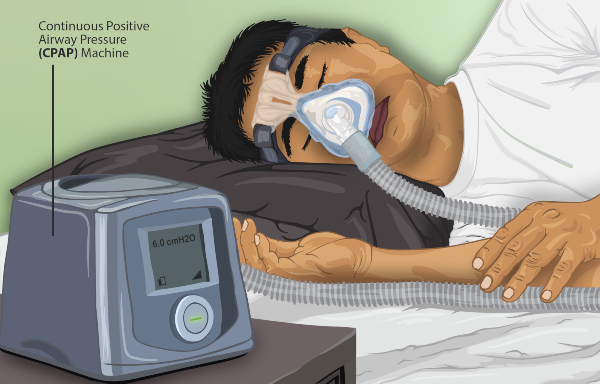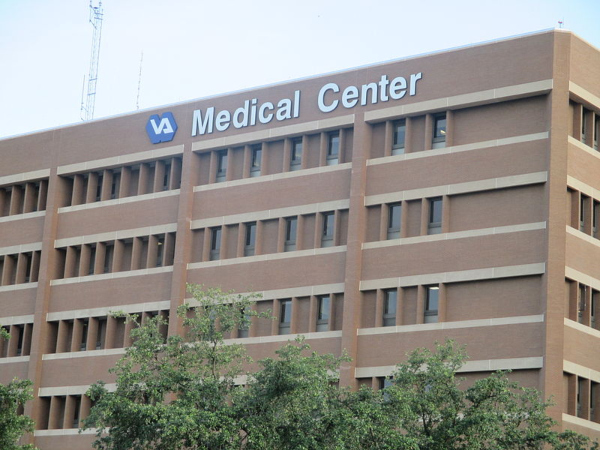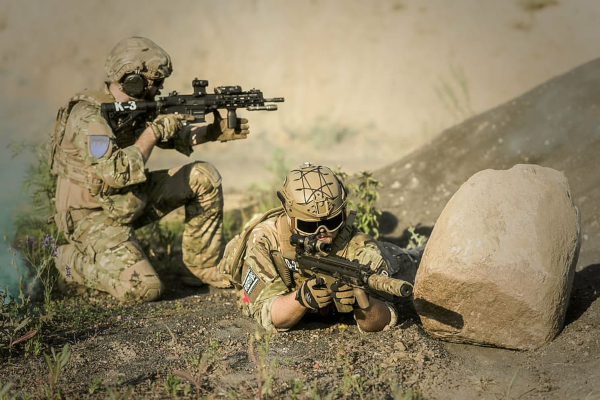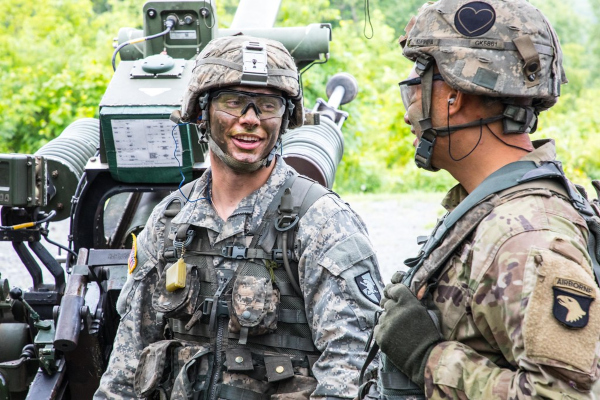Sleep apnea is a serious sleeping disorder that disrupts your quality of life.
The medical condition causes erratic breathing patterns while sleeping.
Consequently, you may snore extremely loudly or feel tired even after a full night’s rest.
Sleep apnea is a condition that negatively impacts a rising number of service members.
The military treats patients by designating a VA disability rating based on the severity of the diagnosis.
Continue reading to learn more about sleep apnea and how to file a claim for VA disability benefits.
Related Article: 15 Best States For Military Retirees And Veterans
What is Sleep Apnea?

Sleep apnea is a serious sleep disorder that disrupts natural breathing habits during periods of rest.
While there are a few different types of sleep apnea, the general diagnosis is that breathing repeatedly stops and starts throughout a sleep session.
Therefore, patients that feel tired after a full night’s rest or snore loudly may suffer from the medical condition.
The 3 main types of sleep apnea include:
- Obstructive Sleep Apnea
- Central Sleep Apnea
- Complex Sleep Apnea Syndrome
Obstructive Sleep Apnea is the most common form and occurs when throat muscles relax while sleeping.
Meanwhile, Central Sleep Apnea is different from Obstructive Sleep Apnea because the brain doesn’t send the proper signals to the muscles that control breathing.
Complex Sleep Apnea Syndrome is the most serious form where the patient suffers from both Central Sleep Apnea and Obstructive Sleep Apnea.
The U.S. Armed Forces generally refer to Complex Sleep Apnea Syndrome as “Mixed” sleep apnea.
Sleep apnea has become the most prevalent service-connected respiratory disability for military personnel.
The VA reports that nearly 1 in 4 respiratory claims for VA disability benefits is linked to sleep apnea.
The military utilizes VA disability ratings to determine the severity of the Obstructive, Central, or Mixed Sleep Apnea.
If you believe you are suffering from sleep apnea, consult a doctor as soon as possible.
There are forms of treatment that can ease symptoms and prevent major heart problems in the future.
Symptoms of Sleep Apnea
The signs and symptoms of Obstructive Sleep Apnea and Central Sleep Apnea are similar.
According to the Mayo Clinic, most patients suffer from one or more of the following symptoms:
- Loud snoring
- Gasping for air during sleep
- Awakening with a dry mouth
- Morning headache
- Irritability
- Difficulty staying focused or paying attention
- Episodes where you stop breathing while sleeping (reported by another individual)
Moreover, most patients with a form of sleep apnea report either difficulty staying asleep (insomnia) or excessive sleep patterns (hypersomnia).
It is difficult to diagnosis the correct type of sleep apnea without speaking to a medical professional since many of the symptoms overlap.
Causes of Sleep Apnea
The two most common types of sleep apnea generally affect the muscles in your throat that control breathing.
When the muscles in the back of your throat start to relax, your airway also narrows.
As a result, victims of sleep apnea in the military do not get enough oxygen to their blood.
The brain recognizes this imbalance and usually attempts to viciously wake you from sleep due to the inability to breathe.
However, the momentary awakening is usually so brief that most patients do not remember a sleep apnea episode.
In general, sleep apnea episodes like snorting, gasping, or choking for air can repeat itself 5-30x or more an hour, all night.
The medical condition severely impacts your ability to get a deep, restful night’s sleep.
Sleep apnea can affect people of all ages, and service members are proving to be extra vulnerable to the medical condition.
Males are traditionally more prone to sleep apnea along with older age and excess weight.
There are other lifestyle choices such as drinking alcohol or smoking tobacco which may contribute to sleep apnea.
Sleep apnea can affect anyone, even children. But certain factors increase your risk.
It can lead to serious or life-threatening complications like high blood pressure, heart problems, type 2 diabetes, and liver problems.
Related Article – 20 Health Conditions That May Disqualify You From Military
Sleep Apnea Rating Schedule for 2020

Sleep apnea is becoming a bigger problem in the United States Armed Forces.
According to the Veterans Benefits Administration (VBA), the three types of sleep apnea (Obstructive, Central, Mixed) lead the way in terms of service-connected respiratory disabilities.
Sleep apnea VA disability claims account for nearly 1 in 4 respiratory claims.
According to the VBA, there were over 282,300 service-connected sleep apnea claims that were awarded in 2017.
The number of VA disability ratings that are awarded for sleep apnea is on the rise, however, it still fails to address the entire issue.
The U.S. Armed Forces utilize VA disability ratings to determine the severity of sleep apnea and these types of claims are notoriously hard to receive approval.
Consequently, the VA denies the majority of sleep apnea claims.
Part of the problem is the VA has altered its rules for assigning sleep apnea disability ratings and providing benefits over the years.
Therefore, many service members are subject to misinformation or interpretation when filing a VA disability claim.
VA Ratings for Sleep Apnea
The VA designates 4 types of ratings for sleep apnea based on the severity of the condition.
Sleep apnea is rated under 38 CFR 4.97, Diagnostic Code 6847, which falls under Sleep Apnea Syndromes:
Lower/Less Severe VA Ratings
0% Rating
The VA rates sleep apnea at a 0% rating if your condition is asymptomatic, but you have a documented history of sleep disorder breathing.
Under this rating, it’s nearly impossible to gain any benefits from the VA as a disability.
30% Rating
The VA rates sleep apnea at a 30% rating if you experience hypersomnolence or excessive daytime sleepiness.
The 30% designation recognizes that the patient is not seeing improvement with a sufficient amount of sleep, or naps during the day.
Under this rating, you have a higher likelihood of receiving approval yet still are against the odds since the military often does not grant VA disability benefits for this type of condition.
Higher/More Severe VA Ratings
50% Rating
The VA rates sleep apnea at a 50% rating if you need a breathing device to assist with your sleeping habits.
Military personnel or veterans that rely on a CPAP machine for breathing assistance fall under this distinction.
Under this rating, you have a 50/50 chance of receiving approval for disability benefits.
You should do your research when submitting the claim to make sure you submit any evidence of sleep apnea (including the reliance on a breathing device).
100% Rating
The VA rates sleep apnea at a 100% rating when chronic respiratory failure is evident through carbon dioxide retention.
Furthermore, the 100% rating for sleep apnea includes the need for a tracheostomy.
Additionally, veterans can file a claim if the right side of the heart is enlarged or experienced failure as a result of lung disease.
Under this rating, military personnel has the strongest likelihood of gaining acceptance for VA disability benefits.
The VA generally approves claims at this rating because it is considered the most severe form of sleep apnea.
How Does the VA Qualify Eligibility for Sleep Apnea?

Veterans can only receive disability benefits for sleep apnea if they can prove the medical condition is “service-connected”.
In other words, patients must prove that a current diagnosis of sleep apnea is related to an in-service event, injury, or illness.
Moreover, a veteran may establish a service connection for sleep apnea through a secondary basis.
In this scenario, the veteran demonstrates that an already service-connected disability contributed to sleep apnea.
The military only accepts service connection on a secondary basis when there is a medical nexus that links the sleep apnea to another service-connected disability.
Secondary Basis Medical Conditions
Fortunately, there are several medical conditions that service members may cite on a secondary basis like:
- Asthma
- Allergic Rhinitis
- Deviated Septum
- Diabetes (Type 2)
- Facial Injuries
- Heart Conditions
- Mental Health Conditions
- Migraines
- Neck Injuries
- Post Traumatic Stress Disorder (PTSD)
- Traumatic Brain Injury (TBI)
- Tinnitus
It is recommended that you meet with a medical professional if you have symptoms of sleep apnea.
The medical condition is serious and you may be entitled to VA disability benefits as a result.
Related Article: Can You Join The Military With Asthma?
How Does the VA Diagnose Sleep Apnea?
Sleep apnea is a difficult condition to diagnosis for a variety of reasons.
For starters, the symptoms for Obstructive Sleep Apnea and Central Sleep Apnea are similar and may overlap.
Therefore, receiving a diagnosis that covers the correct form of sleep apnea is not always apparent at first.
Furthermore, the patient may have Complex Sleep Apnea Syndrome (Mixed Sleep Apnea) which includes both forms.
Sleep apnea is difficult to diagnose unless you sleep with a partner (that notices the irregular sleeping habits).
Consequently, the military traditionally orders a sleep study when sleep apnea is suspected.
The sleep study enables medical professionals to study a patient while they are resting to confirm a diagnosis.
A sleep study can serve as medical evidence of a diagnosis.
Moreover, the VA has an expected duty to assist veterans in scheduling the sleep study examination.
Thus, do not be afraid to contact your local veteran’s clinic or hospital to set up a new examination.
What if you have already been diagnosed with sleep apnea?
The VA will likely still have you undergo a sleep study done by the military to confirm the diagnosis.
Sleep Apnea and PTSD
Recently, the military has found a link between Post Traumatic Stress Disorder (PTSD) and sleep apnea.
There are factors that overlap in both medical conditions that may aggravate or negatively affect the other disorder.
Veterans with PTSD often report disturbances in natural sleep patterns including chronic stress, hyperarousal, and excessive sleep deprivation.
Additionally, research demonstrates that as the severity of PTSD symptoms increase, so does the chances of developing sleep disorders.
As a result, the military is starting to do a better job of accepting new evidence that PTSD and sleep apnea are correlated.
It will hopefully lead to the acceptance of more VA disability claims for sleep apnea in the future.
How do you prove Sleep Apnea is service-connected?
The critical component to gaining approval for VA disability benefits is proving the medical condition is “service-connected”.
What this means it the VA will not approve disability benefits unless the patient can link the medical condition to time served in the military.
The only exception is if you were already diagnosed with a medical condition, yet have evidence that the disorder got worse during your time serving the country.
Veterans have 2 options for proving that sleep apnea is “service-connected”:
- Medical Records/Evidence
- Secondary Basis
The VA traditionally performs a sleep study examination if the patient is suffering from symptoms that may be linked to sleep apnea.
The sleep study can serve as medical proof that your sleep apnea disorder is service-connected if medical records do not provide any evidence before you joined the military.
Secondary Basis Proof for VA Disability Claims
Additionally, service members may attempt to prove their sleep apnea is service-connected through a secondary basis.
The VA accepts disability claims that connect sleep apnea with another medical condition that developed or worsened during service.
For example, medical experts already have found links between asthma, mental health disorders, TBI, and PTSD with sleep apnea.
Therefore, you may be able to prove sleep apnea is service-connected through a secondary condition/basis.
Related Article – Military Star Card Review: Worth Signing Up For?
How to File a VA Claim for Sleep Apnea

Unfortunately, sleep apnea is one of the more difficult medical conditions to receive a VA rating unless there is a clear diagnosis.
Nonetheless, here are the steps to file a VA claim for sleep apnea:
Preparation & Medical Appointments
Step 1: Schedule an appointment with a medical professional to discuss your sleep problems and symptoms.
Step 2: Request that the VA schedule a sleep study examination for sleep apnea. Make sure the sleep test is performed at an approved clinic.
Step 3: Obtain the test results from the sleep study along with a nexus letter from a medical professional. The nexus letter contains the professional opinion that sleep apnea is related to your military service and therefore “service-connected”. This process is referred to as a “direct service connection”.
Step 4: Consider making your case more persuasive by adding a secondary basis (or, secondary service connection). The secondary service connection, such as linking PTSD to sleep apnea helps add value to the claim that you deserve VA disability benefits. There are several conditions linked to sleep apnea in the military such as asthma, hypertension, type 2 diabetes, and mental health conditions.
Completing the Disability Claim
Step 5: Submit a personal statement along with the disability claim. The personal statement outlines when you believe the condition started and how your time in the military made sleep apnea worse. Include as many medical records and evidence as possible.
Step 6: Patients that need a CPAP or another type of breathing device while sleeping should get written acknowledgment from a doctor that the machine is necessary because of sleep apnea. This simple step should guarantee a 50% rating or higher.
Step 7: Some patients opt to include buddy letters from family, friends, and military associates that are familiar with the condition and how it has negatively affected your life.
Step 8: Review the disability claim for errors and submit. Patience is necessary with VA disability claims, particularly those associated with sleep apnea since the government does not have a stellar track record of approving these types of claims.
3 Factors that Influence Sleep Apnea Disability Claims
In summary, you need to prove the following three factors to receive a disability rating for sleep apnea:
- A diagnosis of sleep apnea from a certified sleep study or qualified medical professional.
- The sleep apnea condition started or worsen during service.
- A nexus (connection) is found between the current diagnosis and the in-service event.
An in-service diagnosis of sleep apnea is the clearest path toward approval for VA disability.
However, most service members do not receive a diagnosis while in the military which makes proving that sleep apnea is service-connected much more difficult.
As a result, scheduling a sleep study through a certified clinic is the best means to getting an indisputable diagnosis.
What are the VA disability rates for Sleep Apnea?
The VA rating you receive for sleep apnea determines how much you will receive in monthly compensation for disability.
The VA sleep apnea rating system is under federal code 38 CFR 4.97 Code 6847.
There are 4 distinct VA disability ratings for sleep apnea (0%, 30%, 50%, 100%).
0% Rating
The VA disability rating is non-compensable.
Regardless, you may be entitled to other military benefits such as VA healthcare.
30% Rating
The VA disability rating may receive partial disability coverage.
However, the majority of sleep apnea claims currently get denied by the U.S. military which is why compensation is not guaranteed at the 30% rating.
In most instances, the military deems this rating an inconvenience to your sleep/lifestyle habits yet not detrimental enough to warrant compensation.
50% Rating
The 50% VA disability rating drastically improves your chances of receiving compensation.
The military grants this liability rating when the patient requires a breathing device to assist with sleeping and getting rest.
The 50% rating can have a noticeable impact on your overall combined rating and compensation received.
100% Rating
The highest rating (100% disability) recognizes chronic respiratory problems and failure.
Thus, patients with this rating are entitled to full benefits as long as they can prove the condition is service-connected.
Individual Unemployability Benefits
There are veterans that do not receive a high enough rating to qualify for disability yet may still receive benefits through alternate programs.
For example, the Individual Unemployability benefits often assist veterans with sleep apnea.
Individual Unemployability benefits serve as a safety net for veterans that can’t work but are unable to obtain a 100% rating.
The great news is that Individual Unemployability benefits pay the same as a 100% VA disability rating.
Therefore, it is worthwhile to consider if the initial VA disability claim gets denied for sleep apnea.
Related Article – 10 Benefits Of Being A Military Wife (and 5 not-so good things)
Conclusion

Sleep apnea is a potentially serious condition that makes your breathing erratic while you rest.
It can not only cause sleeping imbalances (insomnia or hypersomnia), but other negative symptoms.
Additionally, it can lead to other serious medical problems such as high blood pressure and heart disease.
If you suspect your sleep apnea developed while you served your country, or is the result of another medical condition (i.e. PTSD) you should apply for VA disability benefits.
While the approval rate for sleep apnea is not incredibly high in the military, the problem is becoming worse which should force the VA to take it seriously.
Sleep apnea can not only interfere with a deep, peaceful rest but can also affect your well-being and way of life.
Contact a medical professional and schedule a sleep study to prove the sleep apnea is service-connected.
It is the only way to receive VA disability benefits for sleep apnea outside of claiming a secondary basis.
- Ikon Pass Military Discount: Learn How To Save Big - January 31, 2025
- RTIC Military Discount: Find Out How To Save Big on Gear - January 30, 2025
- Traeger Military Discount: Learn How To Save Big on Smokers - January 28, 2025


